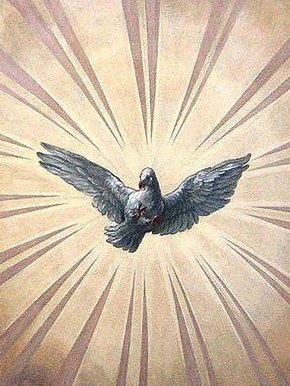
Back Pinkster Afrikaans Pfingsten ALS Pentecosta AN عيد العنصرة Arabic ܦܢܛܝܩܘܣܛܝ ARC عيد العنصره ARZ Cincuesma AST Pentikost bayramı Azerbaijani Pentekostes BCL Пяцідзясятніца Byelorussian
| Pentecost | |
|---|---|
 | |
| Also called |
|
| Observed by | Catholic Church, Old Catholics, Lutherans, Eastern Orthodox, Oriental Orthodox, Amish, Anglicans and other Christians |
| Type | Christian |
| Significance | Celebrates the descent of the Holy Spirit upon the Apostles and other followers of Jesus; birth of the Church |
| Celebrations | Church services, festive meals, processions, baptism, confirmation, ordination, folk customs, dancing, spring and woodland rites. |
| Observances | Prayer, vigils, fasting (pre-festival), novenas, retreats, Holy Communion, litany |
| Date | 50 days after Easter |
| 2023 date |
|
| 2024 date |
|
| 2025 date |
|
| 2026 date |
|
| Related to | Jesus Day, Shavuot, Rosalia, Green Week, Pinkster, Whit Monday, Whit Tuesday, Whit Friday, Trinity Sunday |
Pentecost (also called Whit Sunday, Whitsunday or Whitsun) is a Christian holiday which takes place on the 49th day (50th day when inclusive counting is used) after Easter Day.[1] It commemorates the descent of the Holy Spirit upon the Apostles of Jesus while they were in Jerusalem celebrating the Feast of Weeks, as described in the Acts of the Apostles (Acts 2:1–31).[2] The Catholic Church believes the Holy Spirit descended upon Mary, the mother of Jesus, at the same time, as recorded in the Acts of the Apostles (Acts 1:14).[3]
Pentecost is one of the Great feasts in the Eastern Orthodox Church, a Solemnity in the Roman Rite of the Catholic Church, a Festival in the Lutheran Churches, and a Principal Feast in the Anglican Communion. Many Christian denominations provide a special liturgy for this holy celebration. Since its date depends on the date of Easter, Pentecost is a "moveable feast". The Monday after Pentecost is a legal holiday in many European, African and Caribbean countries.
- ^ Pritchard, Ray. "What Is Pentecost?". Christianity.com. Retrieved 9 June 2019.
According to the Old Testament, you would go to the day of the celebration of Firstfruits, and beginning with that day, you would count off 50 days. The fiftieth day would be the Day of Pentecost. So Firstfruits is the beginning of the barley harvest and Pentecost the celebration of the beginning of the wheat harvest. Since it was always 50 days after Firstfruits, and since 49 days equals seven weeks, it always came a 'week of weeks' later.
- ^ Acts 2:1–31
- ^ Acts 1:14